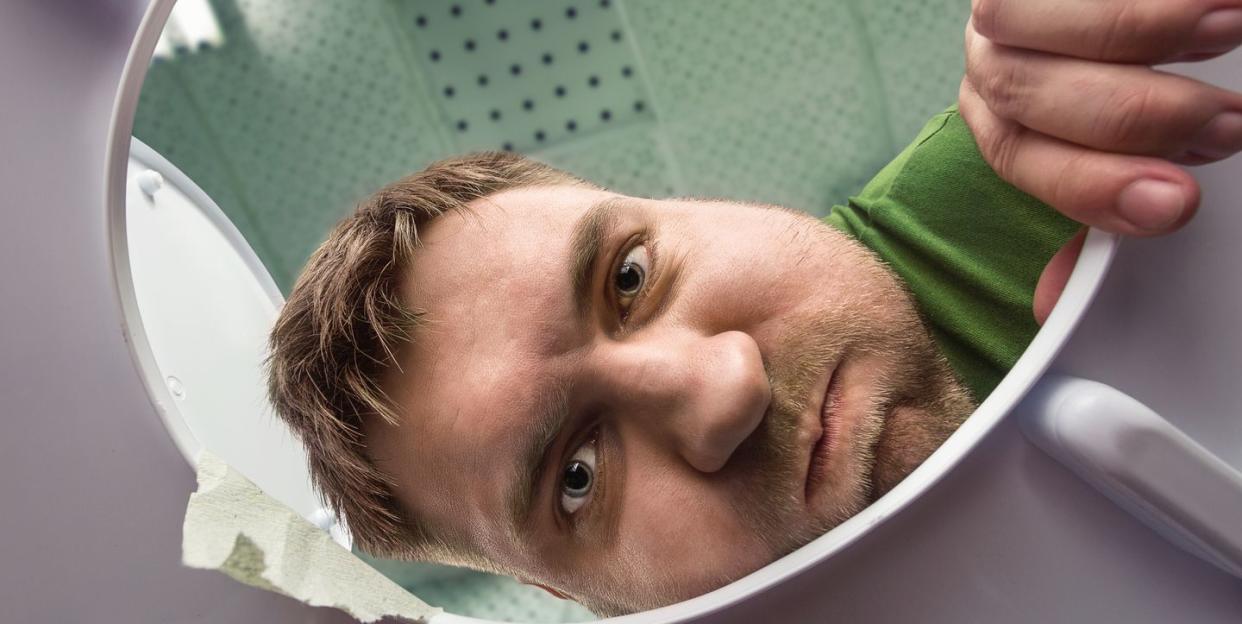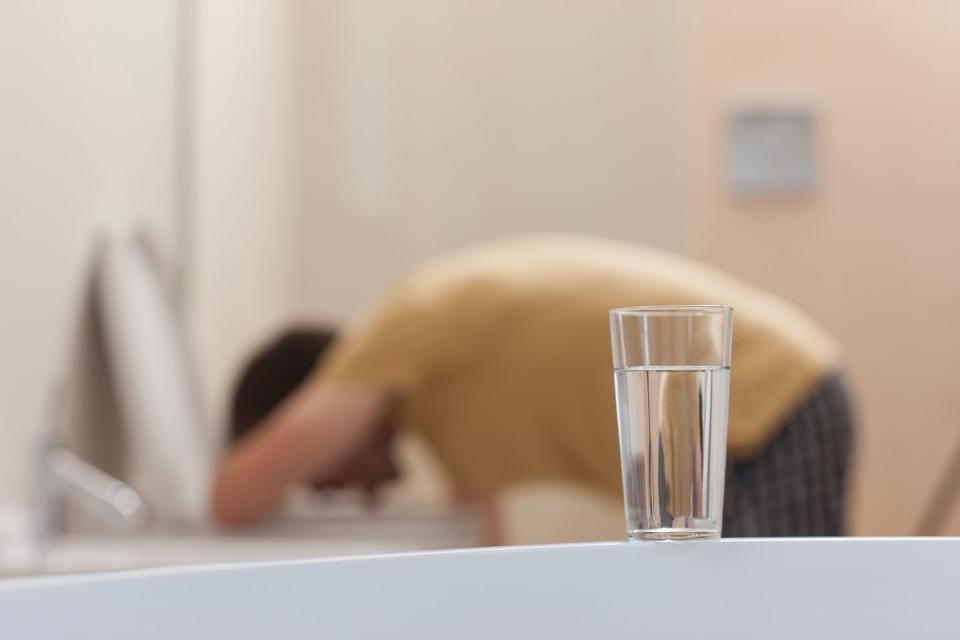This is why too much alcohol makes you throw up

Hands up if you’ve ever ended a heavy night with your head down the toilet? Most of us are all-too familiar with the pitfalls of over-indulgence. Drinking to excess can trigger a cascade of next-day nasties, with symptoms including dry mouth, fatigue, headache, and if you’ve really overdone it, vomiting too.
The morning after the night before can certainly sting. But while you’re shackled to the toilet, praying to the porcelain gods and lamenting that last round of drinks, your body is busy ejecting harmful toxins. So, as unpleasant as throwing up might be, trust us: it’s always best to let nature run its course.
Dr Deborah Lee of Dr Fox Online Pharmacy, and Professor Michael Heneghan, consultant herpetologist from The London Liver Centre at London Bridge Hospital, explain the health consequences of boozy excess, share tips for managing sickly hangover symptoms and detail when to see a doctor:
First, a word of caution: vomiting after drinking should be taken seriously, because it can indicate you have alcohol poisoning. If you suspect you or someone you know has alcohol poisoning, seek urgent medical assistance.
Why does alcohol make you vomit?
Your favourite gin and tonic combination might not taste toxic, but alcohol is, unfortunately, a toxin. When you consume alcohol, the enzymes in the liver get to work breaking down the substance at a rate of about one drink per hour.
During this process, harmful chemicals are released. ‘Alcohol is broken down in the liver to acetaldehyde,’ says Dr Lee. ‘If acetaldehyde levels become too high, your liver, unable to cope, reacts by making you vomit to expel the excess alcohol.’
Unfortunately, alcohol is not just toxic to your liver. ‘Alcohol irritates the stomach wall causing inflammation, known as gastritis,’ she continues. ‘This is exacerbated by an increase in the production of stomach acids. This gastric upset often results in vomiting.’
However, drinking to excess isn’t the only reason you might throw up after a drink. Dr Lee outlines the following reasons why you’re more likely to feel sick or vomit after drinking alcohol:
You’ve been drinking on an empty stomach: having food in your stomach when you drink, especially carbohydrates, slows the absorption of alcohol.
You haven’t drunk enough water: water intake when you are drinking is very important for two reasons; water both dilutes the alcohol and rehydrates you. Alcohol causes dehydration as it increases the need to pass urine.
You’re drinking high-alcohol drinks: rum, which usually has a 40% alcohol content, will raise your blood alcohol levels more quickly than beer, which tends to have an alcohol content of 3-8%.
You’re drinking carbonated drinks: the alcohol in bubbles from sparkling wines and Champagne is absorbed more quickly.
You’re taking certain medications: cimetidine, used to reduce stomach acidity, slows the metabolisation of alcohol. Antihistamines are known to increase the rate of gastric emptying and can speed up the absorption of alcohol.
The signs of alcohol poisoning
Vomiting is also a key symptom of alcohol poisoning, a potentially life-threatening condition that happens when a person drinks so much that their body can’t process the alcohol in their bloodstream.
‘In this serious medical condition, your gag reflex is often compromised, meaning if you vomit, you risk inhaling your own vomit and being unable to breathe,’ says Dr Lee. In severe cases, alcohol poisoning can lead to coma, brain damage and even death.
If you or someone close to you experiences any of the following symptoms, seek emergency medical assistance:
Confusion
Vomiting
Seizure
Slow heart rate
Loss of coordination
Slurred speech
Loss of balance
Drowsiness
Slow, irregular or shallow breathing
Unconsciousness
Conscious but unresponsive
Hypothermia
There’s a difference between being blind drunk and experiencing alcohol poisoning, says Dr Lee. ‘Alcohol poisoning is a medical emergency,’ she says. ‘In the event of this happening, the person who is in danger is unlikely to be able to recognise the signs so they will need help from a friend, family, or passer-by.’
If you think someone is suffering from acute alcoholic poisoning, call for an ambulance. ‘Never just leave them to sleep it off,’ she says. ‘Alcohol levels can continue to rise for 30 to 40 minutes after the last drink. Sit them up if you can. If not, put them in the recovery position. Check the airway is clear and keep them warm. Stay with them until the ambulance arrives.’
⚠️ If you suspect someone has alcohol poisoning, dial 999 immediately for an ambulance.
How to stop throwing up after drinking
When you vomit, your body is ridding itself of a toxin, so don’t try and stop it from happening. Instead, focus on helping yourself feel better until the alcohol has been dealt with. ‘If you find yourself vomiting after a night out, you need to cope with this the best you can,’ says Dr Lee. ‘Don’t lie down flat. It’s important to do all you can not to inhale any vomit.’

To minimise the side-effects associated with vomiting – and hangovers in general – Dr Lee has these tips:
Drink small sips of clear liquid: Wait until about 30 minutes after you last vomited, otherwise it triggers the vomit reflex again. It’s a myth that black coffee helps – in fact, this delays rehydration as it just makes you pee more often. Try sparkling water as this accelerates the breakdown of acetaldehyde.
Get plenty of rest: this is your hall pass for a day filled with napping. Sleep is restorative, so get your head down.
If you exercise, stick to walking: a brisk walk in the fresh air can help you feel better. Don’t overdo the exercise. Sweating it out in the gym will just dehydrate you further.
Don’t try the ‘hair of the dog’ strategy: your stomach deserves a break after the ordeal it’s been through.
Try ginger instead: ginger is a potent antioxidant and has been shown to ease hangovers. It can help relieve symptoms such as nausea, vomiting, and diarrhoea.
Take ibuprofen, rather than paracetamol: paracetamol is metabolised by your liver, so it can compound the problems your liver is facing, putting it at risk of further damage. Aspirin will irritate your stomach, so avoid that too.
Eat bland foods: such as dry toast, crackers, potatoes, or a banana. Avoid foods that can irritate or may be difficult to digest – fatty, oily, or spicy foods, plus milk or cheese.
And remember, time heals all. ‘Sadly, there is no magic potion to help you sober up more quickly,’ says Dr Lee. ‘After an alcoholic binge, it typically takes six to eight hours to feel better – and often a lot longer, depending on how much you have drunk.’
Should you make yourself throw up?
In short: no. Making yourself vomit can cause serious health issues. For one, it strains your oesophagus, potentially causing small tears that lead to bleeding. It also increases your risk of acid reflex – heartburn – and can cause aspiration, which means your stomach contents go into your lungs.
And that’s not all. ‘You can damage the back of your throat by putting sharp objects like fingernails in the back of your mouth, you can compromise your airway, and you risk inhaling your vomit,’ says Dr Lee. If you feel as though you’re going to vomit, wait for it to happen naturally – don’t rush or force it.
Risks of vomiting after drinking
Vomiting after drinking alcohol can be damaging to your health, and puts you at risk of potentially serious side-effects, including:
• Inhaling vomit
If you’ve drunk enough alcohol to vomit, your natural gag reflex will be disturbed, says Dr Lee. ‘You could inhale your own vomit – if your airway is blocked, this causes choking and stops you breathing. Vomiting when severely intoxicated can be fatal. It can also result in pneumonia.’
• Metabolic issues
Drinking alcohol leads to dehydration and low blood sugars, says Dr Lee. ‘When you vomit, this further disturbs your electrolyte balance – your sodium and potassium levels – and worsens your condition,’ she says. ‘Serious metabolic disturbance can lead to fits and seizures.’
• Oesophageal damage
Vomiting forces acidic stomach contents up into the oesophagus, says Dr Lee. ‘This can lead to oesophageal damage with ulceration, tearing, and bleeding – sometimes vomiting blood,’ she says. ‘When tears occur, it’s known as Mallory-Weiss syndrome and requires urgent medical intervention.’
• Tooth damage
Repeated vomiting can damage tooth enamel from excessive exposure to stomach acids, says Dr Lee.
How to avoid throwing up after drinking
If you frequently find yourself vomiting after a night on the tiles, it’s worth taking stock of how many units you’re drinking each time you go out. ‘For men and women, 14 units of alcohol per week is the recommended alcohol intake,’ says Professor Heneghan. ‘This equates to 14 units of spirits, ideally divided over the week rather than drunk at any one sitting.’ Don’t drink spirits? It’s also equivalent to six pints of average-strength beer (4% ABV) or seven medium-sized glasses of wine (175ml, 12% ABV) a week.
You shouldn’t consume all 14 units in one go. ‘Binge drinking is dangerous for your health,’ says Dr Lee. ‘Drinking alcohol should be split into sessions of not more than three or four drinks at a time, and interspersed with alcohol-free days.’ You should always drink with or after a meal – ‘not on an empty stomach,’ she says – and always with plenty of water. ‘Drink slowly and limit your intake,’ Dr Lee continues. ‘Try low-strength alcoholic drinks. After you’ve been drinking, rehydrate yourself fully – take care of your body and your health.’
Help and support with alcohol abuse
If you have any concerns about your drinking, for additional help and support try one of the following resources:
For alcohol addiction services in your area visit NHS.UK
Visit DrinkAware.co.uk for a unit calculator and alcohol advice.
Drinkline is the national alcohol helpline. Call 0300 123 1110.
Alcoholics Anonymous (AA) is a free self-help group.
Last updated: 04-12-2020
You Might Also Like


